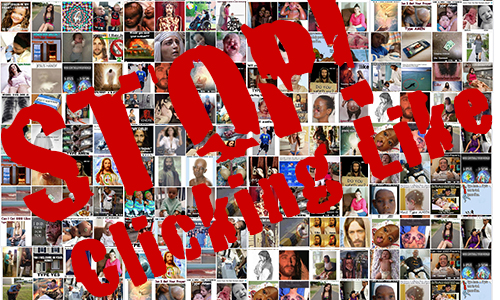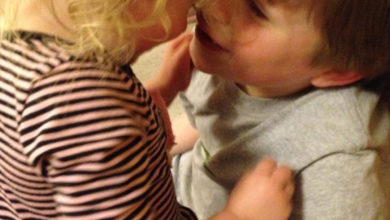Cross-Post: Don’t Like. Don’t Share. Don’t Comment. Don’t Pray.

Editor’s Note: The following article was written by Deek and originally featured on Grounded Parents. A link to the whole article, where you can leave comments, is at the bottom.
******
You may have seen it in your Facebook news feed: a picture of a mother in the NICU cradling her baby surrounded by medical equipment, a smiling child with down syndrome, a trach tube, a cleft palate, or missing a limb. Maybe there’s a frail child curled up in a hospital bed, or even a tiny lifeless body .
The caption urges you to pray or “don’t scroll without typing amen.” It promises that “one like = RIP, share = 1,000 prayers” or tells you to “Share if you think she’s cute.”
Hundreds of thousands of people share, like, and type “amen,” on these photos. But, in actuality, those likes and shares hurt families and only benefit unscrupulous scam artists who exploit people for profit or ego.
Don’t Like, Don’t Share, Don’t Type Amen

It comes down to who benefits from those likes, shares and “amens.” It’s not the family or the child. Often, they don’t even know that their image has been shared. The only people who benefit are shady Facebook users looking to improve their page ranking by preying on the kindness of others.
Facebook determines how interesting a page/person is based on a a tally of the likes, shares and comments that their posts get. The higher the tally, the more visible the page will be in news feeds (more at TechCabel or Time.com).
Posts playing on people’s sympathy to generate likes, shares, and comments are easy ways to boost a Facebook page’s reach. This is called “like farming,” or “facebook farming.” As Lyn Peyok at Dowitcher Designs explains:
“Pages can be used to drive traffic back to a website that then collects ad revenue on all the clicks. . . they can be used to launch phishing scams that attempt to solicit personal information such as contact details, credit cards, and passwords; or to infect your computer with malware.”
But, other than supporting a scam, what’s the harm in liking or sharing? How is it any worse than sharing a funny meme or quote on a lovely background?
It boils down to consent. Chances are good that the family whose photo you see has not given permission to have their child’s image used this way. Many times these photos are lifted from Facebook albums with inadequate privacy settings, blogs, medical websites, image searches, and even from closed Facebook groups without them even knowing.
A Facebook user in a preemie support group I belong to saw a picture shared in her news feed that was heart-stoppingly familiar. In it, a woman held her micro preemie gently with her head bowed. The caption read “her baby died. Type amen.”
Click here to read the rest of the article at Grounded Parents!




